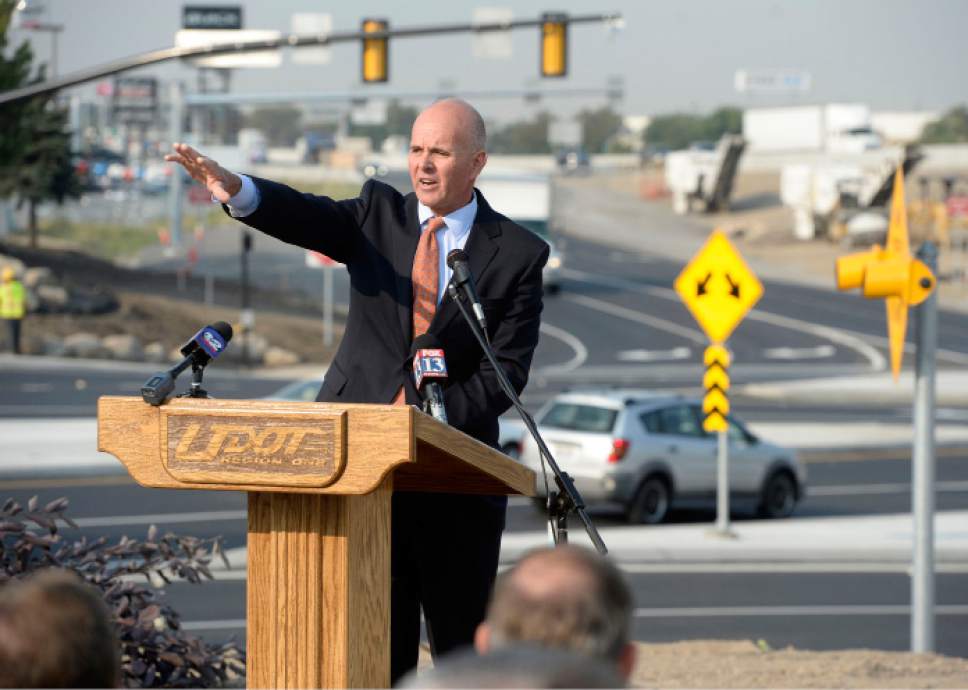This is an archived article that was published on sltrib.com in 2017, and information in the article may be outdated. It is provided only for personal research purposes and may not be reprinted.
Carlos Braceras, executive director of the Utah Department of Transportation, met Friday with President Donald Trump and found they agree that the federal government should stop being an unnecessary roadblock to road work.
"He's aware it takes too long to get projects out" and approved through federal review, Braceras said.
"Time is money to him" as a former developer, Braceras said. "At the end of the day, the projects are there either to save lives, improve mobility or address [road] preservation issues. The faster you bring the product to market, the more benefit it has for the public."
After meeting with Braceras and seven other state directors of transportation in a closed-door, roundtable discussion as part of his "infrastructure week," Trump gave a speech at the U.S. Department of Transportation saying he wants to end "the painfully slow, costly and time-consuming process of getting permits and approvals to build."
He added, "We have structurally deficient bridges, clogged roads, crumbling dams and locks, our rivers are in trouble, our railroads are aging and [we have] chronic traffic that slows traffic that slows commerce and diminishes our citizens' quality of life. Other than that, we're doing great."
Braceras said he was one of three state transportation directors chosen to make a presentation in the closed-door roundtable about challenges they face.
"It was a back-and-forth discussion. He definitely builds things," Braceras said about Trump. "He was very focused on trying to get things quickly to market."
Braceras told Trump, as an example, about how federal red tape has halted a needed roadway near St. George since 1995.
It was stalled as part of efforts to protect the endangered desert tortoise. Once a desert tortoise preserve was created, Congress in 2008 directed the U.S. Bureau of Land Management to identify a transportation corridor across the preserve to help alleviate congestion in St. George.
"The BLM has yet to do that," Braceras said. "Here was a directive from Congress, and they have yet to identify a viable transportation corridor."
Braceras said state officials said while the Federal Highway Administration tries to move quickly as the lead agency for federal review, it is often slowed waiting for concurrent analysis from the Environmental Protection Agency, BLM, U.S. Fish and Wildlife Service, the Army Corps of Engineers and others.
Those other agencies "don't have any ownership" of the process, and "there is no urgency" in their work with no firm deadlines, Braceras said. Worse, when they disagree, the review process often seems simply to halt.
"We're not looking to shortchange any environmental process," Braceras said, but states often are frustrated when review seems to stop or merely inch along — and they are unable to prod it forward.
Braceras said he and other state officials want to set time limits for review. If agencies disagree on a project, they would like to see a way to elevate that for discussion and resolution by a lead agency.
Trump "thought that was a fair idea," Braceras said.
Trump in his speech said the administration would create a new council to help states navigate the federal bureaucratic maze. He said federal agencies that consistently delay projects by missing deadlines will face new penalties.
Also at the opening of the roundtable with state officials, the Associated Press reported that Trump said aging U.S. systems were being "scoffed at and laughed" and he pledged that they "will once again be the envy of the world."
Braceras and the other state transportation directors also met Friday with Transportation Secretary Elaine Chao and Interior Secretary Ryan Zinke. He said he was encouraged that Zinke seemed to offer a fresh approach about how his department will handle review of projects.
Braceras said he felt he was invited to meet with Trump and the secretaries because UDOT is "viewed as one of the most, if not the most, innovative department of transportation in the country. They turn to Utah for a lot of ideas."
He adds, "Utah has a voice at the table, more so than I have seen before."



